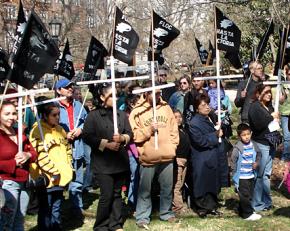FLOC protest targets tobacco giant
By and
WINSTON-SALEM, N.C.--Around 100 people turned out to support the Farm Labor Organizing Committee (FLOC) during the shareholders' meeting of the tobacco corporation Reynolds American Inc.
In a state where nine farmworkers have died in the past year from dehydration and other hazards associated with picking tobacco, such as green tobacco sickness (a form of nicotine poisoning), protesters demanded better working conditions for farmworkers and for Reynolds to meet with FLOC.
Conditions facing farmworkers are deplorable: exposure to dangerous pesticides and nicotine found in tobacco cause nearly one-quarter of all tobacco farmworkers to suffer from green tobacco sickness; only 10 percent of farmworkers report having health insurance through an employer health plan; nearly half of all North Carolina farmworker households cannot afford enough food to adequately feed their families; eight out of 10 farmworkers have had skin disease. A Housing Assistance Council survey of East Coast farmworkers found 38 percent of the housing they live in is unfit for human habitation.

Reynolds American Inc., which makes one of every three cigarettes sold in the U.S., has repeatedly refused to meet with FLOC to hear their grievances. Despite sales in 2006 of $8.5 billion, Reynolds says it can't find the money to improve the conditions of their workers.
Protesters highlighted the fact that Reynolds CEO Susan Ivey's 2007 salary was $9.5 million, while the average annual income for a farmworker in N.C. is just $7,150, less than half the federal poverty level for a family of four.
In a letter to shareholders dated March 30, 2007, Ivey wrote that Reynolds will "continue to maintain a very strong focus on corporate social responsibility." Reynolds, however, has refused to take responsibility for the deplorable conditions of farmworkers on the flimsy grounds that it doesn't employ them directly and thus is not responsible for their conditions.
After a delegation representing FLOC described to shareholders the conditions facing the workers who make Reynolds' profits, a FLOC resolution won 13 percent support among shareholders, which allows the resolution to be heard more easily at next year's meeting.
In an important show of labor solidarity, speakers from other labor struggles pledged their support to FLOC, including Glenna Swinford of the Cleveland, N.C. Freightliner Five, John Crawford of UAW Local 5287 at Thomas Built Buses in High Point, N.C., and AFL-CIO Southern Field Representative Carlos Carrillo. A delegation of 20 United Mine Workers of America from Southwest Virginia likened their struggle against unsafe working conditions to the hazards faced by farmworkers.
Glenna Swinford relayed solidarity at the protest. "How can I possibly compare our story to the tobacco workers?" she said. "Our struggle is about wrongful termination, workers' rights, a contract that will guarantee good pay, health care, retirement and workers' safety. The tobacco workers work and live in the conditions that remind you of the pre-Civil War South. They are treated more like slaves than valued employees.
"Why should these workers be forced to settle for less? Are they not our brothers and sisters? America is not a Third World country, and these workers should not be treated as if they are living and working in one."
Diego, from FLOC in New Mexico, stated, "[M]y father is a farmworker. Every farmworker I see in the fields, I see my father. That's what drives me to give all of my heart and all of my soul and all of my effort to this fight--and fight until these victories happen, because these victories are not just for farmworkers, but for all of society."
Local clergy also lent their support to FLOC, including Rev. Nelson Johnson of the Beloved Community Center in Greensboro, a lead organizer of the Greensboro Truth and Reconciliation Commission that investigated the infamous 1979 KKK shooting of five anti-Klan protesters.


